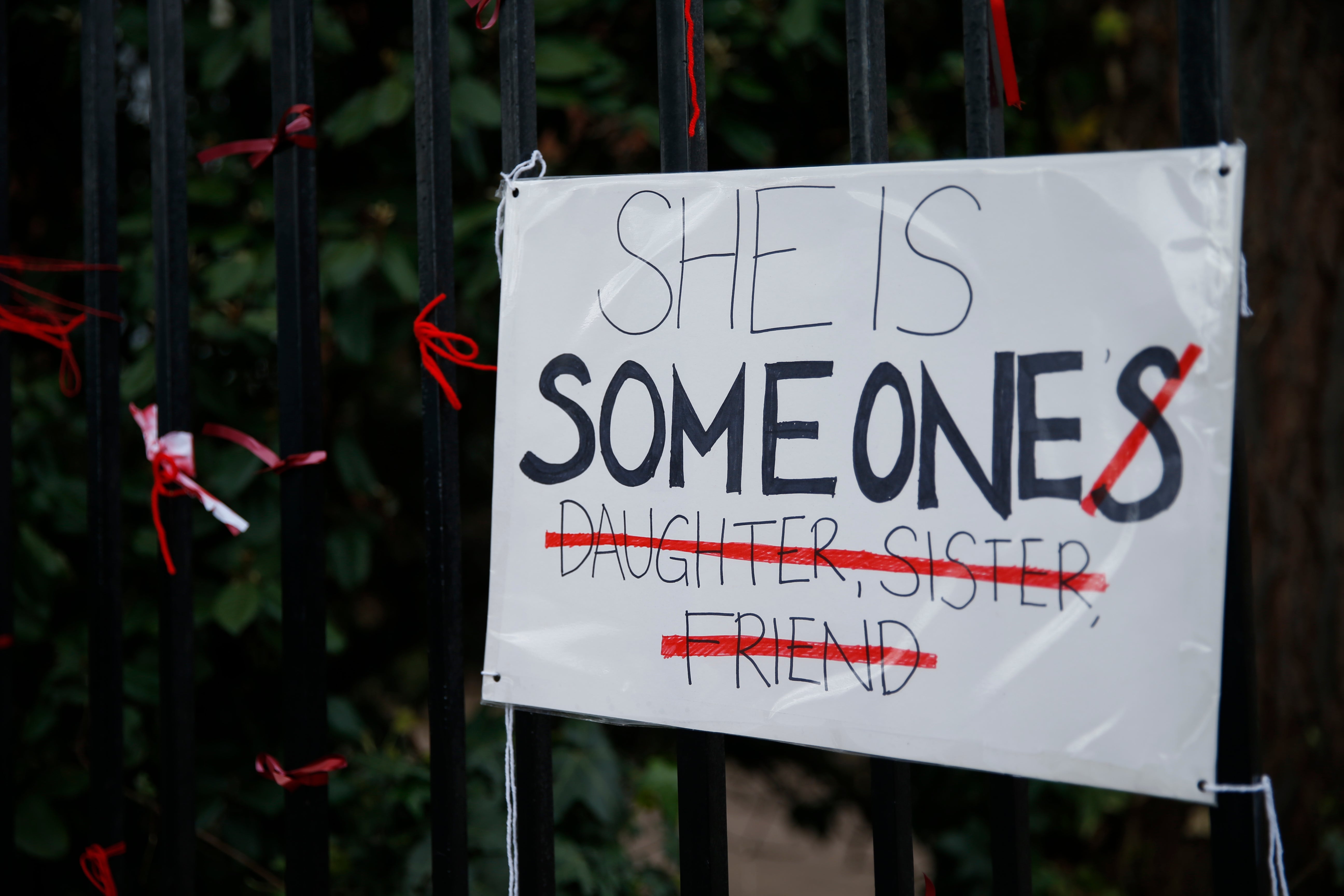Seven in 10 women see government action to stop sexual assault as inadequate, poll finds
Exclusive: ‘The government have dragged their heels on action against violence against women and girls,’ says shadow women and equalities minister

Your support helps us to tell the story
From reproductive rights to climate change to Big Tech, The Independent is on the ground when the story is developing. Whether it's investigating the financials of Elon Musk's pro-Trump PAC or producing our latest documentary, 'The A Word', which shines a light on the American women fighting for reproductive rights, we know how important it is to parse out the facts from the messaging.
At such a critical moment in US history, we need reporters on the ground. Your donation allows us to keep sending journalists to speak to both sides of the story.
The Independent is trusted by Americans across the entire political spectrum. And unlike many other quality news outlets, we choose not to lock Americans out of our reporting and analysis with paywalls. We believe quality journalism should be available to everyone, paid for by those who can afford it.
Your support makes all the difference.Seven in 10 women consider government action to stop sexual harassment, rape and domestic abuse to be inadequate, new research has found.
Exclusive polling by YouGov, carried out for The Independent, also shows that three-quarters of women say men in society don’t “pull their weight” in keeping women and girls safe from violence.
Around a fifth of men deem men to be doing enough in backing women up, which is almost three times the number of women who believe this is the case.
Polling, exploring what people think would make Britain safer for women, comes after debates around male violence against women and girls in the wake of Sarah Everard’s killing.
The 33-year-old marketing executive’s case triggered an outpouring of anger as women shared personal stories about being sexually harassed, assaulted, or abused by men in public spaces, with many blaming the government and authorities for failing to take mistreatment of women seriously enough.
Researchers found six in 10 women deem the police not to be doing enough to tackle violence against women and girls, while around half of men agree.
Shaista Aziz, a women’s rights campaigner, told The Independent: “This research shows again how much work society must do to challenge and dismantle patriarchy and the harm and damage it’s doing to women and girls.
“The responses show again how low levels of trust are in the criminal justice and policing system to hold perpetrators to account.”
A woman is killed by a current or ex-partner every four days in England and Wales, while one in four women will suffer domestic abuse at some point during their lives.
Meanwhile, a recent survey by UN Women found 97 per cent of young women in the UK said they had been sexually harassed, while 80 per cent reported experiencing sexual harassment in public spaces.
Researchers polled more than 1,000 women aged between 18 to 24 and found the sexual harassment included being groped, followed and coerced into sexual activity.
The poll found around nine in 10 women deem tougher sentencing for sexual harassment, sexual assault and domestic abuse would be “very effective” in tackling these issues, while only around half of men said the same.
Marsha De Cordova, the shadow women and equalities minister, told The Independent: “The government have dragged their heels on action against violence against women and girls. The death of Sarah Everard and ensuing outrage must be a watershed moment for change.
“It is positive to see that the public supports action to toughen sentences to keep perpetrators of violence against women and girls off the streets for longer.
“Labour’s plan to keep women safe would toughen sentences for rapists and stalkers, prioritise fast-tracking rape cases in our courts, introduce new laws to prosecute sexual harassment and introduce whole life sentences for men who rape, murder and kidnap women.”
Campaigners have long warned rape has been effectively decriminalised in the country, with prosecutions and convictions for sexual assault and rape reaching record lows last year. Government data shows in the year to March 2020 that just 1.4 per cent of 55,130 rape cases recorded by police resulted in prosecution.
Andrea Simon, director of End Violence Against Women Coalition, noted the exclusive findings demonstrate “very few women” deem men to be “doing enough to tackle the behaviour and comments” of fellow men.
She added: “Which highlights just how important the role of men is in speaking out against the attitudes that condone, tolerate and minimise sexual harassment and assault of women. Crucially, women do not find the government and criminal justice system is doing enough either.
“And a huge amount of work needs to go into ensuring that women have confidence to come forward and report abuse. This can only happen if victims are believed, reports are taken seriously, and specialist women’s services are resourced to provide support.
“Changing social attitudes over time are leading to more women rejecting the notion that they should be concerned with how to stay safe, and instead, the focus of women’s safety needs to be squarely on how we prevent and identify men who commit offences.”
Ms Simon noted educating young people about sexual consent and respectful relationships at school will stop some abuses but argued “high-quality interventions with known perpetrators” are needed to stop them inflicting harm on more women.
Rose Caldwell, chief executive of Plan International UK, argued in spite of the “shocking frequency of harassment, girls told us they don’t know where to report it” – adding that current laws are not “fit for purpose”.
The leading charity’s research found one in three girls in this country have been harassed in their school uniforms. A separate study by Plan International which came out last spring found young women say sexual harassment, including men indecently exposing themselves, has become worse during the lockdown.
Researchers, who polled more than 1,000 young women and children aged between 14 and 21, found one in five have suffered harassment on the streets since the government implemented stringent social distancing measures – with a fifth of them saying the issue of harassment has got worse in lockdown.
Maya Tutton, who runs the Our Streets Now campaign to end street harassment with her sister Gemma, said the latest study shows “that educating boys is one of the key routes for tackling this problem”.
She added: “Our Streets Now is working to get public sexual harassment onto the curriculum and into schools in order for this cultural change to take place.”
A Home Office spokesperson said keeping women and girls safe from violence and abuse is a “key priority” for the government.
The representative added: “Just this week, the domestic abuse act was signed into law and provides protection to millions of people as well as strengthening measures to tackle perpetrators.
“Following the tragic case of Sarah Everard and the subsequent outpouring of stories from victims and survivors, we reopened our call for evidence and the 180,000 responses received will inform our new Tackling Violence Against Women and Girls Strategy.
“The government has also provided more funding for measures such as street lighting and CCTV, as well as introducing Sexual Harm Prevention Orders, Sexual Risk Orders and Stalking Protection Orders.”

Join our commenting forum
Join thought-provoking conversations, follow other Independent readers and see their replies
Comments